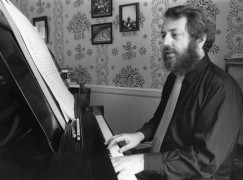The Metropolitan Opera, which has already pledged its Chagall paintings to the bankers that control its debt, has added a pair of Maillol sculptures to the pawnbrokers’ pile. The Met showed a $21.9 million deficit in the last fiscal year. Bloomberg has the numbers here.
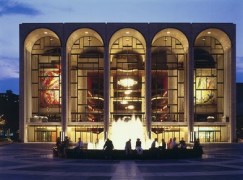
Simon Rattle signed on today as music director of the London Symphony Orchestra. He succeeds Valery Gergiev.
Rattle, 60, will work harder than Gergiev in rehearsal and will diversify the repertoire. He has launched a campaign for London to have a new concert hall. He has made clear, however, that he will continue to live with his family in Berlin.
More thoughts here on absenteeism and the LSO.
Press release follows.
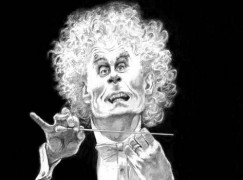
The London Symphony Orchestra announced today the appointment of Sir Simon Rattle as its Music Director.
He will take up his appointment in September 2017, following in the footsteps of previous Principal Conductors including André Previn, Michael Tilson Thomas, Sir Colin Davis and Valery Gergiev. As Music Director he will be involved in every aspect of the LSO’s work as well as championing the importance of music and music education.
At the announcement of his appointment, Simon Rattle said: “During my work with the LSO over the last years, I noticed that despite the Orchestra’s long and illustrious history, they almost never refer to it. Instead, refreshingly, they talk about the future, what can they make anew, what can they improve, how can they reach further into the community. In terms of musical excellence, it is clear that the sky’s the limit, but equally important, in terms of philosophy, they constantly strive to be a twenty-first century orchestra. We share a dream in which performing, teaching and learning are indivisible, with wider dissemination of our art at its centre. I cannot imagine a better or more inspiring way to spend my next years, and feel immensely fortunate to have the LSO as my musical family and co-conspirators.”
Simon Rattle outlined his vision for universal access to music, with children and young people at its heart. He called for new standards in making world-class music available to all. He stated his aim that every musician should be engaged in composing, improvising, mentoring and performing; that the creation of new music will be central to the process, working with leading composers and teachers; and that his appointment will generate new partnerships between London and the whole country to confirm the UK as a world leader in the arts.
Simon Rattle is currently Chief Conductor and Artistic Director of the Berliner Philharmoniker, where he was appointed in 2002. His first appearance with the London Symphony Orchestra was in October 1977, at the age of 22. He conducted the LSO at the opening ceremony of London 2012 Olympic and Paralympic Games, memorably performing Chariots of Fire with Rowan Atkinson. Most recently, in January this year, he was acclaimed for his two concerts with the LSO of Schumann, Stravinsky, Webern, Berg and Ligeti at the Barbican Centre.
Lennox Mackenzie, Chairman of the LSO, said: “I am thrilled that Sir Simon Rattle has accepted our invitation to lead the Orchestra into the future. On behalf of our whole Orchestra, we welcome him as our Music Director at this hugely important moment in the LSO’s history. I would also like to offer the Orchestra’s sincere thanks to Valery Gergiev who has been the LSO’s Principal Conductor since 2007 and who steps down from his position at the end of this year.”
Kathryn McDowell, Managing Director of the LSO, said: “This is the realisation of a dream, to bring Simon Rattle back to his home country to lead the extraordinary musicians of the LSO. We look forward to a new chapter of ambitious music-making that reaches deep into the communities we serve and touches people’s lives with the power of music.”
Sir Nicholas Kenyon, Managing Director of the Barbican Centre, said: “We are delighted to welcome Sir Simon Rattle to the LSO, our resident orchestra since the Centre opened. The presence of a world-class orchestra at the heart of this world-class arts centre, serving the widest range of audiences across London and beyond, has been an indispensable part of the Barbican’s success. We look forward to a period of thrilling development as Simon Rattle takes the LSO to ever greater heights of musical achievement and service to the community.”
Professor Barry Ife, Principal of the Guildhall School of Music & Drama, said: “Sir Simon Rattle’s commitment to the next generation of musicians and to music education is world renowned. His appointment as Music Director of the LSO is an exciting opportunity, particularly for the students of the Guildhall School who regularly perform alongside the LSO’s musicians.”
I shall be in Budapest next Wednesday, lecturing at the Franz Liszt Academy on the present state of the music business. In advance of the presentation, the Liszt Academy has published an essay I have written on the music world’s over-dependence on a shrinking pool of international stars. Read the article here.
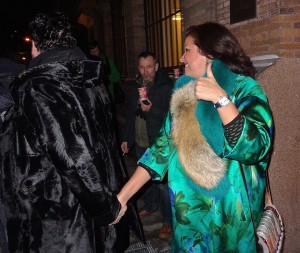
The life of Paul Verlaine cannot be mistaken for the lives of saints. Leaving his wife for Arthur Rimbaud, he went to jail for shooting the younger poet in a fit of jealous rage. Along the way, he wrote some of the most unforgettable lines in French poetry, set by all the great French composers and some of the most popular entertainers.
A radical new interpretation is my five-star Album of the Week. Click here.
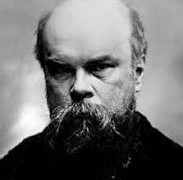
We have been informed of the death of Jenny Ward-Clarke, a key (if shy) figure in London’s early music and contemporary music ensembles.
Cellist with Fires of London, and Roger Norrington’s principal with his London Baroque/Classical Players, she was a member of the Salomon String Quartet and taught for decades at the RAM and RCM. ‘A kinder person one would be hard pressed to find,’ says a grieving colleague.
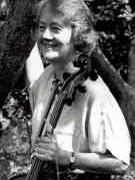
Ezra Laderman, composer of 12 string quartets, 11 concertos, and eight symphonies; six dramatic oratorios, music for dance, seven operas, and music for two Oscar-winning films, died on Saturday. He was Dean of Yale School of Music, 1989 to 1995.
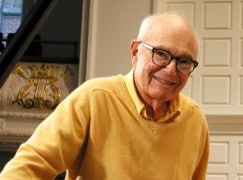
Appreciation here.
The president of the LA Philharmonic will be teaching at Harvard from September to the end of the year. We want to join her class. Press release below.

Los Angeles, CA (MARCH 2, 2015)— The Center for Public Leadership (CPL) at Harvard Kennedy School (HKS) announced today that Los Angeles Philharmonic President and Chief Executive Officer Deborah Borda will join the Center for Public Leadership community as a Hauser Leader-in-Residence. Borda is the first arts executive to hold the post. Her appointment will begin in September 2015, at which time she will take a four-month sabbatical from the Philharmonic.
Borda is widely regarded as one of the most successful arts executives in the United States, and is known for her innovative approach to shaping the role of orchestras in the 21st century. She has led the LA Phil, which maintains the largest operating budget of any American orchestra, into an era of robust artistic and financial health. In partnership with the LA Phil’s lauded Music Director Gustavo Dudamel, Borda has developed a portfolio of influential artistic and educational programs, including such high-profile initiatives as the in/SIGHT series, the El Sistema-inspired Youth Orchestra LA, and the most active commissioning program in the country. Her ambitious vision for the LA Phil, combined with her business acumen, has earned the organization an unrivaled reputation for artistic excellence and creativity worldwide.
Says CPL executive director Patricia Bellinger, “Deborah is an adventurous and smart leader. Through her bold management of the LA Phil, I’ve witnessed her commitment to social responsibility and her value of collaboration across disciplines—themes woven throughout our leadership curriculum at CPL. Deborah pushes the envelope, and we can’t wait for her to bring her expertise and savvy to our graduate students.”
The pensive pianist Stephen Hough never shrinks from expressing a provocative thought, even if it’s still in an embryonic form. This morning he has come up with a terrific idea. You are not Jewish until you live like a Jew, not Christian until you act like one, not a musician until ‘until the vibrations are excited, in the head or in the air or in the soul’.
Read Stephen’s blog here. I’ll join his next road show.

Denys Darlow, an influential teacher and conductor of historically informed performance, has passed away.
Founder of the Tilford Bach Festival in the early 50s and later the London Handel Festival, Denys worked with many of Britain’s finest baroque musicians and singers, most notably in rarely performed Handel.
James Rutherford writes:
While making my first tentative steps in the business I had the chance to sing alongside Emma Kirkby, James Bowman, Stephen Varcoe and Charles Daniels under Denys’ direction – a vocal masterclass in style and technique. Denys was a huge supporter of young talent as conductor, teacher and choirmaster. Perhaps this was most evident in his many years as conductor of Handel Opera at the Royal College and Royal Academy.
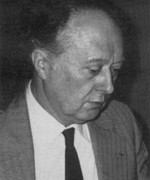
Denys was a man of strong faith and perhaps my most treasured memory of our work together was the Good Friday St. Matthew Passion at St. George’s Hanover Square (where Denys was also organist for many years). This was not a performance but an act of worship, sung in English in Denys’ own translation with a sermon before Part 2 and the audience/congregation would also sing the hymns when appropriate. What endeared me to Denys’ idea of ‘historically informed performance’ was not just the recreation of how the music was played but more importantly why.
From Alan Watkins (on orchestralist):
I record the death a few days ago at the Mount Sinai Hospice NY of the timpanist and percussionist Michael Aaronson after a long battle against serious illness.
While probably not well known in “name” terms he was a significant timpanist and percussionist in the busy New York scene for over forty years and played across a very wide range of music from full symphony to Broadway and pretty much everywhere in between.
He is known to his colleagues as an expert on timpani heads and mallets and was, at one time, involved with helping Ludwig design timp heads which were, then, a significant improvement on what was currently on the market.
He was a graduate of Juilliard where he studied timpani under Saul Goodman. He had battled serious illness for sometime with his usual built in optimism.
He was the “first choice extra” for the New York Philharmonic for a long time and can be heard on Bernstein’s recordings of the Mahler symphonies for Deutsche Grammophon.
He was regularly consulted by timpanists well outside America for his views on all manner of matters concerning the kettledrums.
RIP and condolences to his family.
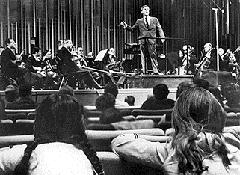
Robert Vernon, the longest serving string pprincipal in the annals of the Cleveland Orchestra, will retire in mid-2016 after 40 years as principal viola. His record (below) is phenomenal. His departure is part of an accelerating veterans march out of the elite ensemble.
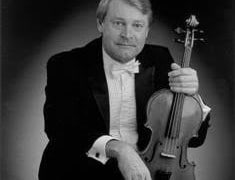
- He has performed in more than 5,000 concerts with The Cleveland Orchestra.
- As soloist, he has appeared in 17 different works in more than 120 concerts at home in Severance Hall. He has appeared as soloist with The Cleveland Orchestra in Carnegie Hall on three separate occasions, as well as performing as soloist at Lincoln Center for the Performing Arts, The John F. Kennedy Center for the Performing Arts, and Boston’s Symphony Hall. Additionally, he has appeared as soloist on two United States tours and one European tour.
- He has recorded more than 300 works with The Cleveland Orchestra, virtually the entire standard repertoire, for five different record labels.
- He has made numerous solo recordings, including Berlioz’s Harold in Italy, Mozart’s Sinfonia concertante, Strauss’s Don Quixote, and Schoenfield’s Viola Concerto, as well as numerous chamber music recordings.
- photo: Roger Mastroianni
The Boston Globe reports the death of William Thomas McKinley, 76. He was a former head of jazz at the New England Conservatory. Obituary here.
